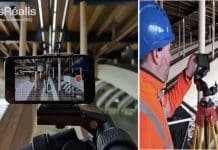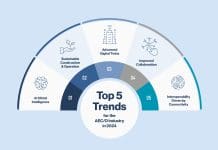For years, talk has won out over action in our fight against climate change. But now, it seems industries are finally waking up to their responsibility to make sustainable progress. In this article, Tom Noctor, team lead and strategic product consultant at Procore explains how digital technology and green skills can aid in sustainability goals
To some extent the drive for a sustainable future in construction can be credited to last year’s COP26 which brought the spotlight, and much-needed pressure, to the global effort to reduce carbon emissions and reach net zero.
Now, more countries are setting increasingly ambitious targets, with all industries having to match their steps by ensuring their operations are sustainable and proofed for a greener, more mindful future.
Construction is no different. In fact, the pressure may be even greater owing to the scale of the problem. According to the World Green Building Council (WGBC), the construction industry is one of the biggest climate culprits with pre-pandemic figures suggesting a contribution of 38% to total global energy-related CO2 emissions.
An attitude shift in how we can offset this impact is equally needed, as despite such high figures, Arup found that less than 1% of building projects are currently evaluated in a way that quantifies the scale and source of carbon emissions generated. A worrying sign if we are to meet the UK government’s ambitious plan to go net-zero by 2050.
So how can construction change this? One way is adopting the right digital technology tools which optimise processes, produce better insights, drive down rework and waste, and much more. But one element which can take this a step further is having green skills.
How green skills can transform construction
Green skills are those that can benefit the environmental sustainability of an individual or an organisation’s activities. According to LinkedIn’s Global Green Skills Report 2022, the growing emphasis on climate change has filtered into the job market, with those listing green skills on their profile or working in green jobs increasing by 38.5% between 2015 and 2021.
Construction is one industry which has a high concentration of these skills, yet workers are transitioning out of the industry at a rate faster than those coming in. In fact, construction falls into a bracket where for every hundred workers transitioning into non-green jobs, as few as 47 workers transition into green and greening jobs.
This is bad timing to say the least, and it’s imperative that we must arrest this green talent drain. The government has recognised the need, with the Construction Industry Training Board (CITB) in the early planning stages of developing green training modules for current and future construction professionals.
Efforts like this are critical because the potential for green talent in construction is wide-ranging. From retrofitting existing properties to become more carbon neutral, to carbon accounting and calculating and even identifying opportunities to source homegrown construction materials and save on importing from overseas. Efficiencies are there to be made throughout the lifecycle of construction projects. Furthermore, roles based in MMC, and particularly BIM modelling, have a huge say in building a sustainable future thanks to their design powers.
Why green skills go hand-in-hand with construction technology
So broad are the benefits of construction technology that there are multiple pre-existing ways in which the digitisation of our industry supports sustainability. These include a platform technology’s ability to make huge time savings across a project, reduce rework, and through keeping workforces better connected and enabling remote working, driving down personal fuel usage.
But when we add green skills and talent into the mix, construction technology has truly transformative potential.
Perhaps the biggest boon to green talent looking to make a difference in construction is that when paired with platform technology, sustainability is no longer seen as an extracurricular concern to a project’s lifespan, but one of its pillars. Rather than a consideration that easily slips down the agenda in the face of the multiple demands of a complex project, sustainable goals set via a platform are easily adhered to and visible for all a team to see at all times.
Take BW: Workplace Experts as an example. BW has set itself a goal to achieve Net Zero Carbon. This means offsetting any carbon that cannot be removed during the processes of what it does. Part of this involves looking at building a sustainable supply chain by using the right tools and technologies.
Integrations can help companies make such changes and take sustainable efforts to a greater height. Take our carbon calculator as an example. When implemented through our platform, it allows green talent in a team to assess the carbon footprint of materials, the cost of finding alternative materials, and even view the overall emissions of an entire project. These insights are exactly what’s needed to get serious about reducing our carbon footprint.
Another area of where improvements can be made is better use of data. Quality and real time data is critical for a company’s green talent to be able to identify ways to cut emissions, and resolve defects quickly but also sustainably. This is an area which platform technology excels in, as operating from one single source of truth that acts as a home to project data, current and past, gives owners and contractors all the information they need to set sustainable benchmarks, meet compliance standards and drive change.
What and why actions need to be taken
A sustainable construction industry will not only benefit our planet, but retain talent in construction. This is vital as our industry will stand to benefit from drawing from a more diverse pool of talent and growing in its appeal to younger generations for whom climate change is an increasingly pressing issue.
As for perceptions within construction, there will always be those resistant to change. But the match between construction technology and green talent can provide the perfect demonstration of just how easy doing things sustainably can be. Plus in a future where standards and compliance are becoming stricter, it’s no longer an option to join the effort.
How we help solve the climate crisis is by working together. And for construction, this starts with green skills and technology solutions.
Tom Noctor
Team lead and strategic product consultant
Procore
Twitter: @procoretech
LinkedIn: Procore Technologies

















